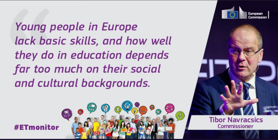10/11/2017
FSG International
 The European Commission has presented the sixth edition of its annual Education and Training Monitor, a snapshot of EU's national education systems that measures the EU´s progress towards the 6 EU education targets for 2020
The European Commission has presented the sixth edition of its annual Education and Training Monitor, a snapshot of EU's national education systems that measures the EU´s progress towards the 6 EU education targets for 2020 The report shows that Member States are making progress towards key EU targets such as reducing the rate of early school leavers below 10% or reaching the 95% participation in early childhood education and care. It also shows that across the EU, investment in education has recovered from the financial crisis and increased slightly (1% year-on-year in real terms). About two-thirds of Member States recorded a rise. Four countries increased investment by more than 5%.
However, this year´s Monitor also confirms an alarming trend; many young people lack basic skills and how well they do depends far too much on their social and cultural backgrounds.
Roughly, 1 in 5 Europeans at the age of 15 does not reach the basic level of competence in reading, maths and science. The EU as a whole is therefore moving further away from the objective to reduce the share of 15-year-old pupils who underachieve in basic reading, maths and science to 15%.
The figures reveal persistent inequality. The latest PISA results show, for example, that pupils from the most disadvantaged backgrounds are 5 times more likely not to reach a basic level of competence in science than those with the most privileged background.
At the press conference, Tibor Navracsics, EU Commissioner for Education, Culture, Youth and Sport, expressed his deep worry and urged all to do more to ensure that all children and young people have access to high quality education. The Commissioner said all children and young people “deserve equally good chances to lead successful lives as engaged and independent citizens. This is a question of securing sustainable economic growth and competitiveness and what is more, it is a question of fairness”.
The Commission announced that it would step up action to support Member States to make sure education delivers for all as outlined in the two communications on school and higher education presented in May. The Commission will, for example, identify good practices and offer voluntary tools for Member States, as well as provide up-to-date evidence that Member States can base their education reforms on.
The Commission is confident that the Monitor will drive reform and modernization and will presented its results to Heads of State and Governments at the EU Social Summit in Gothenburg on 17 November where they will discuss education and culture.
The Commission has also announced that it will organise the first ever EU Education Summit in January 2018 to strengthen a political consensus to take reforms forward and make sure all young people have the best start in life.
FSG welcomes the commitment of the Commission to drive reforms of the EU educational systems in order to overcome inequalities and to make sure they cater for people from disadvantaged backgrounds. Education systems have a special role to play in building a fairer society by offering equal chances to everybody.
FSG also calls for specific measures targeting groups from disadvantaged backgrounds, such as those from Roma origin, who are over-represented in the share of early school leavers and school underachievers. As revealed by the report from the EU Agency for Fundamental Rights (EU-MIDIS II), Roma children lag behind their non-Roma peers on all education indicators. On average, 18 % of Roma between 6 and 24 years of age attend an educational level lower than that corresponding to their age and in Spain, for example, as high as 64.4% of Roma students between 16 and 24 years of age do not complete lower secondary education (ISCED level 2). Furthermore, in some countries ethnic segregation in education remains a widespread phenomenon.
Background
The Commission's Education and Training Monitor 2017 is the sixth edition of this annual report that shows how the EU's education and training systems are evolving by bringing together a wide array of evidence. It measures the EU's progress on the six Education and Training 2020 targets: (1) The share of early leavers (aged 18-24) from education and training should be less than 10%, (2) the share of 30 to 34 year-olds with tertiary educational attainment should be at least 40%, (3) at least 95% of children between the age of four and the age for starting primary education should participate in education, (4) the share of 15 year-olds with underachievement in reading, mathematics and science should be less than 15%, (5) 82% of recent graduates from upper secondary to tertiary education (aged 20-34) who are no longer in education or training should be in employment, (6) at least 15% of adults (aged 25-64) should participate in formal or non-formal learning.
The Monitor analyses the main challenges for European education systems and presents policies that can make them more responsive to societal and labour market needs. The report comprises a cross-country comparison, 28 in-depth country reports, and a dedicated webpage with additional data and information. The Investment Plan for Europe, the Erasmus+ programme, the European Structural and Investment Funds, including the Youth Employment Initiative, theEuropean Solidarity Corps as well as Horizon 2020, and the European Institute of Innovation and Technology help stimulate investment and support policy priorities in education.
For More Information
Education & Training Monitor 2017
